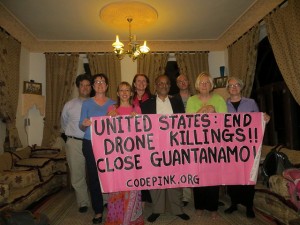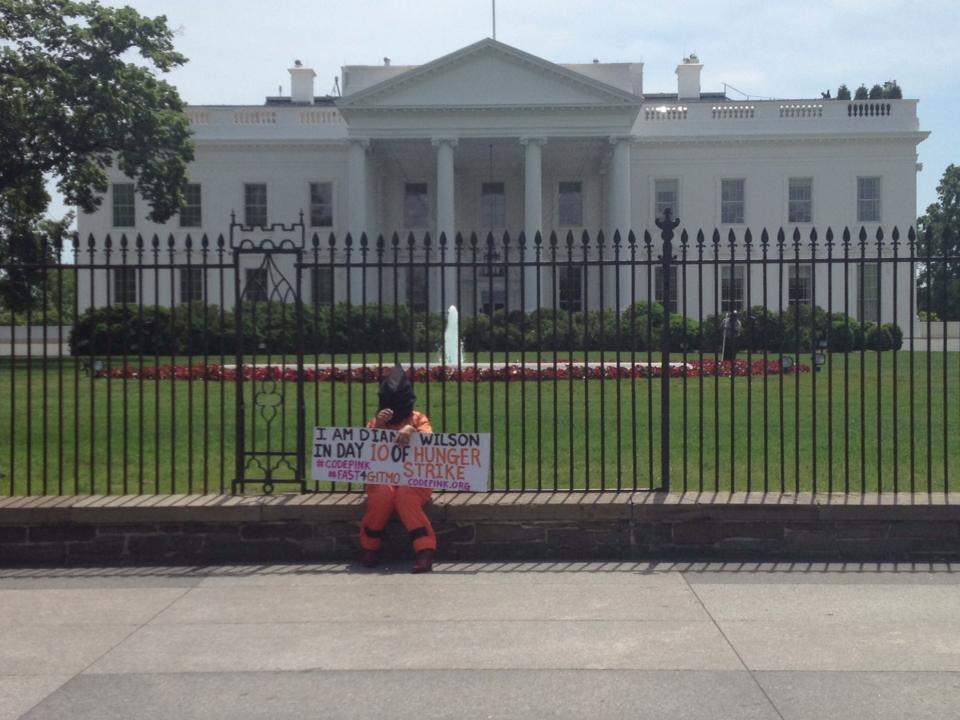
Medea Benjamin with American peace delegation in Yemen; June 2013 Photo Credit: codepinkhq
Medea Benjamin, Co-founder of Code Pink and Global Exchange, reports back from a recent delegation to Yemen:
“In Yemen we are close to the bottom in all kinds of measures like income and education, but there’s one statistic where we come out on top: the number of prisoners in Guantanamo,” laughed Mohammad Naji Allaw, a successful Yemeni lawyer who ploughs his firm’s profits into the National Organization for Defending Rights and Freedoms. “Over 90 of 166 Guantanamo prisoners are from Yemen. Most of them, 56 to be exact, have already been cleared by the US government for release but the US government still won’t send them back.”
Our American peace delegation spent the week in Yemen meeting with lawyers, human rights activists, government officials and most importantly, families with loved ones in Guantanamo.
While we were visiting, Congress passed an amendment saying that no US military funds could be used to transfer prisoners from Guantanamo back to Yemen. The families and Yemeni officials we met were outraged. “You mean that after detaining Yemenis for over 11 years without charges and trials, refusing to release even those prisoners who have been cleared of all wrongdoing, forcing them to starve themselves to call attention to their plight, you’re saying that Congress is going to make it even harder to send them home?,” they asked us. “How can this be?”
How could we explain this to the mother of Abdulhakeem Ghaleeb, who hasn’t seen her son since he was 17 years old in 2002, a mother who can’t eat a meal in peace, knowing that her son has been on a hunger strike since February 6 and is now so weak he can’t speak? How can we explain this to 12-year-old Awda, who was in her mother’s womb when her father Abdulrahman Al Shubati was carted off to the island gulag, and here she was, holding his picture with tears streaming down her cheeks? What could we say to Ameena Yehya, whose brother had been sending home letters with beautiful drawings of flowers and scenes from their village, but stopped even writing five years ago because he is too hopeless to lift his pen? Or to Ali Mohammed, who said that on video call arranged every two months with the Red Cross he barely recognized his brother—a lifeless skeleton with sunken eyes and a big, inflated nose from where the feeding tube is forced down his nostrils?
We couldn’t bear to tell them the truth: that their sons, husbands, fathers and brothers are simply pawns in the US game of politics where one party is always trying to “out hawk” the other, where concern about winning the next election far eclipses any respect for the rights of the prisoners. And we didn’t have the heart to tell them that most American have become so consumed by fear after 9/11 that they think that holding these prisoners in Guantanamo indefinitely somehow makes them safer?
So instead we hugged and cried together. Our delegation explained that we are totally opposed to this cruel policy. We told them that over 300,000 Americans have signed petitions calling for Guantanamo to be closed. We talked about Americans like CODEPINK co-founder Diane Wilson and Veterans for Peace Elliott Adams who are risking their own lives on a long-term solidarity hunger strike—Diane since May 1 and Elliott since May 17. We showed them photos of our protests outside the White House. I mentioned that I even interrupted President Obama’s national security speech on May 23, demanding that he take action to release the 86 prisoners cleared for release. But gnawing constantly on our minds was the fact that we are just not doing enough, not caring enough, not creative enough, not strategic enough to force a change in policy.
In 2009, President Obama had cleared 56 Yemenis for transfer home, 26 immediately with 30 others to follow. But days after Christmas Day attempt to bomb an aircraft as it was landing in Detroit, Obama placed a moratorium on the transfer of Yemeni detainees. The would-be bomber, Nigerian Umar Farouk Abdulmuttalab, who had hidden plastic explosives in his underwear, told U.S. investigators that he’d been recruited for the mission in Yemen by Anwar al Awlaki, the US-born cleric who was later killed in a U.S. drone strike in 2011.
Human Rights Minister Hooria Mashoohouras heard US officials say that Yemeni government is not stable enough or strong enough to make sure the released prisoners don’t take up arms against America. They have told her that even if some of the prisoners were totally innocent and unjustly imprisoned, now—after 11 years behind bars—they probably hate the US so much that they’ll want revenge. In our meeting with Mashoohourshe threw up her arms in exasperation. “So you abuse these men and then you keep abusing them because they might hate you for your abuse? Is that the way the US justice system works?,” she asked.
Mashhour said the Yemeni government has already agreed to assign 10 government ministries to monitor repatriated detainees to ensure they don’t threaten the United States. The returnees, she said, would receive counseling, job training and other aid. She also explained how she went to Washington DC in May to sign a Memorandum of Understanding to release the cleared Yemeni prisoners, but left empty handed, complaining that she was never received at the White House.
Now the US government is setting up another obstacle: it wants Yemen to set up a rehabilitation center, but it has not committed money to fund it. Many people we talked to in Yemen believe the US government should not only fund the rehabilitation center, as this is a problem that the US created and Yemen has no money, but that it should also compensate the prisoners who have been wrongly imprisoned.
Instead, the US Congress is trying to cut off funds that could even be used to send the prisoners home. The Congressional amendment passed on June 14 is designed just for Yemen, prohibiting Department of Defense funds from being used to repatriate Yemenis. This doesn’t become law unless it is passed by the Senate and signed by the president. So there’s still time to stop it.
When we spoke about this amendment to Nadia Sakkof, an extraordinarily talented young women who is one of the key organizers of the National Dialogue Committee, she sprung into action. “Excuse me,” she apologized, running over to her computer, “but this is simply unacceptable and I must do something about this right now.” She fired off a message of outrage to her contacts in the U.S. Congress and wrote a letter to her colleagues at the National Dialogue Committee, asking them to join her in complaining to the US government about this new affront. By the end of the next day, 136 members of the National Dialogue had signed on and she had delivered the letter to the US Ambassador.
The following day, June 17, we planned the first-ever protest of Yemenis and Americans outside the US Embassy in Sanaa. Our 7-person delegation arrived at 10 am, thinking that perhaps a few dozen Yemenis would join us. After all, it was a weekend, the place was hard to get to, and they had very little notice in advance.
We waited, we heard a commotion. Marching up with street, in bright orange jumpsuits, were several hundred Yemeni families and their supporters. They were chanting “Freedom, freedom, where are you? Human rights, human rights, where are you?”
After the chants and speeches, we brought out a letter to send to President Obama, via the Embassy, in the name of our delegation and the Yemenis. One by one, starting with the women, the Yemenis came up to sign the letter. The ones who couldn’t write stamped their fingerprints. Even the children signed. The guards allowed a few of us to cross the barricades so we could deliver the letter to an Embassy representative. We also reiterated to the Embassy staff that earlier in the week, Ambassador Gerald Feierstein had promised to us he would meet with some of the families, and we hoped he would fulfill that promise.
At the end of the rally, we visited the National Dialogue Committee, which has been meeting for several months to co-build the foundations for a more democratic, peaceful nation. We brought orange ribbons for delegates to wear as armbands to show support for the Guantanamo prisoners. Even the security guards and reporters wanted to wear them. The 300 armbands we had quickly disappeared, with people asking for more. The support for the prisoners among the different political parties and independents at the National Dialogue is nearly universal. They say the refusal of the administration to release the Yemenis is an affront to the nation’s pride.
Attorney Mohammad Naji Allaw told us he has lost faith in Obama but he still has faith in the American people. We must work together to turn a noble page in American history. These prisoners are nearing death; time is running out. Please, go back and tell your friends in America that these are real human beings with real families, all of whom are suffering every day. The American people must do more to stop this.”
TAKE ACTION!
- Join UN International Day in Support of Victims of Torture! This Wednesday, June 26th join CLOSEGITMO and others who are organizing to close Guantanamo & end U.S. torture. There will be a large action in DC with many folks from across the country joining them.
- Watch this powerful video about Guantanamo prisoners:



